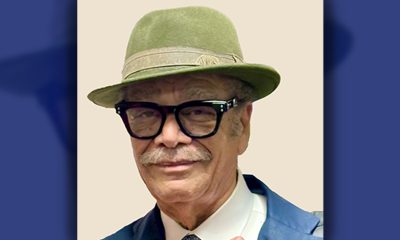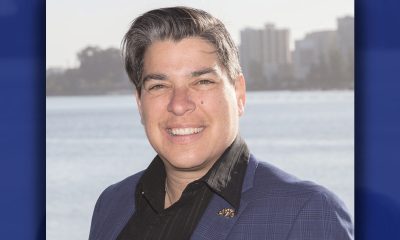Health
Founding of the ABPsi & Black Mental health: From Impulse to Impact

By Wade W. Nobles, Ph.D Co-Founder The ABPsi, Professor Emeritus SFSU
As many of you know, 50 years ago, a small group of professional Black psychologists and students (including myself) walked out of the American Psychology Association (APA). In its silence, we believed, the APA condoned and supported the rampant and deleterious ignorance and racism in psychology as a discipline.
The Association of Black Psychologists (ABPsi) was, in fact, born in the social, cultural, and political vortex of the civil rights and Black power movements occurring in the United States. We as men and women identified ourselves as Black first and psychologists second.
Our association was created to particularly address the significant social problems affecting the Black community and to positively impact on the mental health of the national Black community through planning, programs, services, training, and advocacy. The ABPsi has continually worked to help to eradicate health disparities and barriers to treatment and healing for Black youths and families facing mental health problems.
The ABPsi has successfully fought to prevent the miss-labeling of Black Children as mentally retarded, legally filed Amicus Curiae briefs on racial discrimination; challenged the miss-use of IQ testing; provided expert testimony as to the deleterious effect of the conditions of the San Quinton Adjustment Center on Black inmates; filed an Amicus Curiae brief with the U.S. Supreme Court supporting a petition for rehearing the Legion vs. Weinberger case, highlighting the gross inequities in the Medicare and Medicaid coverage that imposes limitations on medical and mental health care for large numbers of Black patients in public mental hospitals; created the Journal of Black Psychology and the Psych Discourse in order to give unfiltered voice to the expertise of Black Mental health professionals.
Provided key leadership with Bay Area Chapter members, Asa Hilliard, Reginald Jones, William Pierce, Harold Dent, Gerald West, and Bill Thomas, serving as witnesses for the plaintiffs, the ABPsi participated in the historic Larry P. Trial on racial discrimination and IQ testing.
The ABPsi challenged the National Institutes of Health’s research on tying genes to crime and identified this research into genetic predispositions to crime research as a blatant form of stereotyping and racism. The ABPsi has developed culturally congruent training methods for mental health providers, such as Trauma Informed Care, Emotional Emancipation Circles, HIV/AIDS prevention and Cultural Competency training for working with African Americans.
The ABPsi responded to the national disaster resulting from Hurricane Katrina and deployed a disaster restoration team to Haiti after the island nation was disastrously traumatized and devastated by the magnitude 7.0 earthquake.
The ABPsi regularly provides Expert Testimony to the Congressional Black Caucus. With the adoption of New Orleans Accord, the ABPsi established the Global Pan-African Initiative and the Joint ABPsi and FAP educational Task Force to further co-create a psychology that respects and reflects the human authenticity and integrity of African people. The ABPsi has dedicated itself to serving, protecting and supporting the restoration of wellness with Black persons, families and community
From a small group of committed Black Professionals to a level of organizational structure that encompassed 4 regions and 12 local chapters throughout the United States as well as international chapters in Canada, Great Britain and Brazil, the ABPsi has grown from an impulse to protect the Mental Health of African American people to an agent of significant impact and service in healing the African American mind.
The ABPsi’s 50th Annual International Convention will be held June 27th-July 1st, 2018, at The Marriott Oakland City Center, in Oakland, CA. Come join this gathering of psychologists, university professors, health care professionals, educators, researchers, students and everyday folk.
The Bay Area chapter of the ABPsi is committed to writing a monthly special Critical Black Mental Health issues column for the Post newspaper.
The Bay Area Chapter of the ABPsi can be contacted at bayareaabpsi@gmail.com
Alameda County
Access Better Health with Medically Tailored Meals – Transforming Health Through Nutrition for Medi-Cal Patients
Launched in 2018, the Medically Tailored Meals pilot program was designed to help Medi-Cal patients with congestive heart failure by reducing hospital readmissions and emergency department visits by providing tailored meals meeting specific dietary needs. The program’s success in improving health outcomes and reducing costly emergency room visits encouraged the Department of Health Care Services (DHCS) to expand the Medically Tailored Meals program to all 58 counties through Medi-Cal transformation and a new set of services called Community Supports.

Advertorial
Launched in 2018, the Medically Tailored Meals pilot program was designed to help Medi-Cal patients with congestive heart failure by reducing hospital readmissions and emergency department visits by providing tailored meals meeting specific dietary needs.
The program’s success in improving health outcomes and reducing costly emergency room visits encouraged the Department of Health Care Services (DHCS) to expand the Medically Tailored Meals program to all 58 counties through Medi-Cal transformation and a new set of services called Community Supports.
Medically Tailored Meals are one of 14 new services offered through Medi-Cal that provide members with access to new and improved services to get well-rounded care that goes beyond the doctor’s office or hospital.
Medically Tailored Meals: Overview
Malnutrition and poor nutrition can lead to severe health outcomes, especially among Medi-Cal patients with chronic health conditions. Medically Tailored Meals aim to improve health outcomes, reduce hospital readmissions, and enhance patient satisfaction by providing essential nutrition.
Key Features:
- Post-Discharge Delivery: Meals are delivered to patients’ homes immediately following discharge from a hospital or nursing home.
- Customized Nutrition: Meals are tailored to meet the dietary needs of those with chronic diseases, designed by registered dietitians (RD) or certified nutrition professionals based on evidence-based guidelines.
- Comprehensive Services: Includes medically tailored groceries, healthy food vouchers, and food pharmacies.
- Educational Support: Behavioral, cooking, and nutrition education is included when paired with direct food assistance.
Key Benefits:
- Address Food Insecurity: Mitigates poor health outcomes linked to food insecurity.
- Support Complex Care Needs: Tailored to individuals with chronic conditions.
- Improve Health Outcomes: Studies show improvements in diabetes control, fall prevention, and medication adherence.
Patient Testimonial:
“My diabetes has gotten better with the meals. I’ve kept my weight down, and I feel much better now than I have in a long time. I’m one of the people this program is meant for.” — Brett
Eligibility:
- Eligible Populations: Eligible Medi-Cal members include those with chronic conditions like diabetes, cardiovascular disorders, congestive heart failure, stroke, chronic lung disorders, HIV, cancer, gestational diabetes, and chronic mental or behavioral health disorders. Also, those being discharged from a hospital or skilled nursing facility or at high risk of hospitalization or nursing facility placement are also eligible.
- Service Limitations: Up to two meals per day for up to 12 weeks, extendable if medically necessary. Meals eligible for reimbursement by alternate programs are not covered.
Cost Savings and Improved Health Outcomes:
- Health Outcomes: Research indicates a 22% to 58% decrease in emergency department visits and a 27% to 63% decrease in inpatient admissions among Medically Tailored Meals recipients, translating to significant health care cost savings.
Project Open Hand: A Success Story
Project Open Hand has been a leader in providing Medically Tailored Meals, significantly impacting the lives of Bay Area Medi-Cal patients with chronic illnesses. Since its inception, Project Open Hand has delivered nutritious meals to individuals with diabetes, HIV, and other serious health conditions, demonstrating remarkable health improvements and cost savings.
Key Achievements:
- Improved Health Outcomes: Project Open Hand’s research found a 50% increase in medication adherence among recipients of Medically Tailored Meals.
- Reduced Hospitalizations: Their program showed a 63% reduction in hospitalizations for patients with diabetes and HIV.
- Enhanced Quality of Life: Patients reported better health and increased energy levels.
Project Open Hand ensures that each meal is prepared using fresh, wholesome ingredients tailored to meet the specific dietary needs of its clients. By partnering with Medi-Cal managed care plans, Project Open Hand continues to provide life-saving nutrition to those who need it most.
Join Us in Our Mission
You can experience the profound impact of Medically Tailored Meals by joining the Medi-Cal Community Supports services initiative. Your involvement can make a difference in promoting your health through nutrition.
Learn More
For more information about Medically Tailored Meals and how to get involved, call the state’s Medi-Cal Health Care options at 800-430-4263 or contact your local managed care plan.
In Alameda County, Medi-Cal recipients can contact:
* Alameda Alliance for Health: 510-747-4567
* Kaiser Permanente: 855-839-7613
In Contra Costa County, Medi-Cal recipients can contact:
* Contra Costa Health Plan: 877-661-6230
* Kaiser Permanente: 855-839-7613
In Marin County, Medi-Cal recipients can contact:
* Partnership Health Plan of California: 800-863-4155
* Kaiser Permanente: 855-839-7613
In Solano County, Medi-Cal recipients can contact:
* Partnership Health Plan of California: 800-863-4155
* Kaiser Permanente: 855-839-7613
Your health and well-being are your health care provider’s top priority. Medically Tailored Meals are designed to enhance quality of life by advancing health care through the power of nutrition. Experience the benefits today, and take the first step toward a healthier you.
California Black Media
Not So Sweet: California State Health Campaign Highlights Dangers of Sugary Drinks
The California Department of Public Health (CDPH) and CalFresh Healthy Living, the state’s nutrition assistance program, recently launched a health campaign to illuminate the risks of drinking sugar-sweetened beverages and the health benefits of hydrating with water. The “Not So Sweet Side” initiative encourages families to make informed decisions about the drinks they choose and to be aware of the sugar content present in them.

By Edward Henderson, California Black Media
The California Department of Public Health (CDPH) and CalFresh Healthy Living, the state’s nutrition assistance program, recently launched a health campaign to illuminate the risks of drinking sugar-sweetened beverages and the health benefits of hydrating with water.
The “Not So Sweet Side” initiative encourages families to make informed decisions about the drinks they choose and to be aware of the sugar content present in them.
According to the campaign, consuming too much sugar has been associated with an increase in chronic conditions and diseases such as type 2 diabetes, heart disease and tooth decay. African Americans face a higher risk of developing diabetes mellitus, heart disease and tooth decay.
Dr. Redieat Assefa is a pediatrician at Riverside University Health Systems. She spoke at a webinar hosted by California Black Media introducing the campaign to ethnic media publishers across California.
Assefa underscored the importance of reading labels on sugary drinks you may consume and how to identify drinks that contain too much.
“When reading a nutrition label, there are a few key components that I would like us to consider. The first thing is the serving size of your sugary drinks. Is it one can? Is it one bottle? Then you go down to your total carbohydrates, which can be broken down to your fibers and sugary, added sugars or non-added sugars.”
To simplify the process, compare the grams of sugar in a box of Apple Juice with preservatives that could be around 40 grams of sugar and that of natural juice which averages around 6 grams.
Assefa also added that research indicates that African American women who drink one to two sugary beverages daily have an increased risk of type 2 diabetes. Sugary drinks can lead to high blood pressure, hype, and hypertension, contributing to a greater risk of heart disease among African American young adult men who, on average, consume sugary beverages at a higher level than other groups.
Assefa pointed out that there are about 10 teaspoons of sugar in a single can of soda.
Dr. Maxmillian Chambers, a dental professional and public health advocate, also spoke on the panel promoting the campaign highlighting the impact sugary drinks can have on dental health.
“As we continue this dialogue, it’s crucial to turn our focus to oral health, a key component of our overall well-being that doesn’t often receive the attention it deserves. Sugary drinks are a significant contributor to tooth decay. Research shows that drinking more than two eight-ounce servings of sugary beverages per week can drastically increase the risk of cavities. And for our youth, particularly those aged 9 to 18, sugary drinks are primary sources of added sugar in their diets.”
Lakeysha Sowunmi, a mom and public health advocate who has worked to influence state policy and mobilize communities, including churches, around health issues, said, “I work with families on a budget, for example, and help them understand CalFresh and the resources that are available. We talk about portion control. We talk about feeding big families.”
The CalFresh Healthy Living Program is led by CDPH’s Nutrition and Physical Activity Branch. To explore recipes, resources, and tips for making healthier beverage choices, visit http://uncoverhealthyhabits.com/
Black History
Health is Our Wealth: An Afrocentric Perspective to Health & Wellness
When I was an early-career mental health professional, my close friend was coming up in his construction career. We came up in the hood together, learning life lessons from living the street life. As we grew in our fields, we wanted to showcase our hard work and income though our appearances and the valuables we owned. I flaunted the flyest sneakers, and he customized his car rims as status symbols. Our understandings of wealth, worthiness, and wellness as young Black professionals reflected Eurocentric materialism, which we have now discovered is unhealthy.

By Art Harris
When I was an early-career mental health professional, my close friend was coming up in his construction career. We came up in the hood together, learning life lessons from living the street life. As we grew in our fields, we wanted to showcase our hard work and income though our appearances and the valuables we owned. I flaunted the flyest sneakers, and he customized his car rims as status symbols. Our understandings of wealth, worthiness, and wellness as young Black professionals reflected Eurocentric materialism, which we have now discovered is unhealthy.
It became imperative for us to re-align our concepts of health, wealth and wellness with African-Centered philosophies. This is what Baba Dr. Wade Nobles refers to as Sakhu (Skh), the illumination of the spirit via African science, study, understanding, and knowledge in his book Seeking the Sakhu: Foundational Writings for an African Psychology. It takes awareness, intentionality, and commitment to raising our consciousness and shifting from Eurocentric paradigms of health, wealth and wellness to Afrocentric ones.
Baba Wade teaches us that racism is the pre-existing condition in America and in The Island of Memes: Haiti’s Unfinished Revolution, he explains that the liberation of the African mind can only happen when we return to an African consciousness. Only a healthy mind can produce a healthy body. Many of the unhealthy urges African Americans experience are a result of imagery planted by the mentally ill White supremacist culture. In enslaving and oppressing Africans in America, the White supremacist culture destroyed our ancestral memories, rituals, and conceptions of health.
African-centered anthropologists and scholars have looked to the Nile Valley civilizations of ancient Kemet (Egypt) and Kush to illustrate the historical greatness that is our legacy. Profound teachers, ministers, researchers, and psychologists like Malcolm X, Tony Browder, Dr. Ivan Van Sertima, Dr. Asa Hilliard III, Chiekh Anta Diop, and Drusilla Dunjee Houston highlight the great contributions of African people to the fields of medicine, science, religion, politics, architecture, and more.
In his books Spirituality Before Religions and the Shabaka’s Stone, Professor Kaba Hiawatha Kamene teaches that the principles of Ma’at (truth, justice, harmony, balance, propriety, order, reciprocity) ensured morality and justice were at the center of maintaining a healthy, righteous Kemetian society.
For myself, it took a growth mindset and reading books like New Visions for Black Men and Breaking the Chains of Psychological Slavery by Dr. Na’im Akbar. Now, about 20 years later, my friend and I both have advanced in our fields and we now value health and wealth as it pertains to physical, familial, financial, mental, and spiritual wellness.
As we reconnect to natural approaches to healing and attune with what is/is not healthy for people of African ancestry, then we can realize health, wellness, and joy for our families and communities.
About the Author
Art Harris is a Bay Area native, veteran of the U.S. Navy, licensed marriage and family therapist, and school psychologist. He is the Bay Area Chapter of the Association of Black Psychologists (Bay ABPsi) Continuing Education Unit Co-Coordinator. Bay ABPsi Chapter is a healing resource committed to providing the Post Newspaper with monthly discussions about critical Black Mental Health issues. Please join us at our meetings every 3rd Saturday via Zoom or contact us at bayareaabpsi@gmail.com.
-

 Alameda County5 days ago
Alameda County5 days agoAlameda County District Attorney Pamela Price Announces $7.5 Million Settlement Agreement with Walmart
-

 Activism3 weeks ago
Activism3 weeks agoCOMMENTARY: DA Price Has Done Nothing Wrong; Oppose Her Recall
-

 Activism2 weeks ago
Activism2 weeks agoOP-ED: Hydrogen’s Promise a Path to Cleaner Air and Jobs for Oakland
-

 Activism3 weeks ago
Activism3 weeks agoBarbara Lee, Other Leaders, Urge Voters to Say ‘No’ to Recalls of D.A. Pamela Price, Mayor Sheng Thao
-

 Community2 weeks ago
Community2 weeks agoTerry T. Backs Oakland Comedy Residency by Oakland’s Luenell at Jimmy Kimmel’s Comedy Club in Las Vegas
-

 Activism3 weeks ago
Activism3 weeks agoOakland Post: Week of October 9 – 15, 2024
-

 Business2 weeks ago
Business2 weeks agoStudy Confirms California’s $20/Hour Fast Food Wage Raises Pay Without Job Losses
-

 Bay Area2 weeks ago
Bay Area2 weeks ago2024 Local Elections: Q&A for Oakland Unified School Candidates, District 3































































